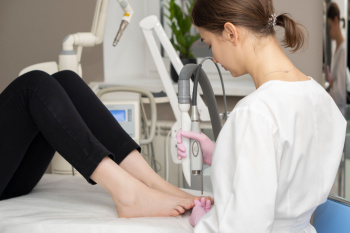Blog
Choosing Running Shoes for Different Distances

Selecting the right running shoes for various distances is vital to ensure comfort, prevent injury, and improve performance. For shorter distances, such as sprints or 5Ks, lightweight shoes with more flexibility are ideal. These shoes offer quick responsiveness, allowing for fast foot turnover. For longer distances, like half-marathons or marathons, shoes with more cushioning provide extra support and shock absorption to reduce the impact on joints. Support is also essential, particularly for runners who experience overpronation or underpronation. Stability shoes help correct these issues, offering a more controlled stride and reducing the risk of injury. Cushioning should be balanced with support, ensuring that the shoe does not feel too soft or too firm, which can lead to discomfort. Additionally, flexibility plays a role in ensuring natural movement, especially for long-distance runners, as it helps maintain proper form and minimizes fatigue. If you have endured a foot or ankle injury from wearing the wrong running shoes, it is suggested that you consult a podiatrist who can treat various foot conditions, and guide you on what type of shoes to wear.
You should always make sure your running shoes fit properly in order to avoid injury. For more information, contact one of our podiatrists from Pennsylvania. Our doctors can provide the care you need to keep you pain-free and on your feet.
Choosing the Right Running Shoe for Your Foot Type
Improper shoe sizing can cause a myriad of problems for your feet. Shoes that don’t fit you properly can lead to muscular imbalances in your body, which can result in foot, knee, and hip injuries.
Tips for Finding the Right Running Shoe
- Make sure you have a thumb’s width of wiggle room between the end of your longest toe and the front of the shoe.
- There should be little to no slipping at the heel
- Don’t assume your size in one shoe brand will be your size in another
- Do not lace up your shoes too tightly
- Walk around in the store with your new shoes before you buy them
If you have any questions please feel free to contact our one of our offices located in Plymouth Meeting and Ambler, PA . We offer the newest diagnostic and treatment technologies for all your foot and ankle needs.
Grades and Risk Factors for Ankle Sprains

Ankle sprains occur when the ligaments surrounding the ankle are stretched or torn. They can range from mild to severe, depending on the extent of the damage. There are three main grades of ankle sprains. A Grade 1 sprain involves slight stretching of the ligaments, often causing mild pain and swelling. A Grade 2 sprain indicates a partial tear, resulting in moderate pain, swelling, and difficulty walking. A Grade 3 sprain is the most severe, where the ligament is completely torn, leading to significant pain, swelling, and instability. Several risk factors can increase the likelihood of an ankle sprain, including engaging in sports that involve jumping, running, or sudden changes in direction. Wearing improper footwear and having weak or imbalanced muscles are other risk factors. Symptoms of an ankle sprain typically include pain, swelling, bruising, and difficulty moving the ankle. If you have ankle pain and feel you may have sprained your ankle, it is suggested that you consult a podiatrist who can provide an accurate diagnosis and treatment.
Ankle sprains are common but need immediate attention. If you need your feet checked, contact one of our podiatrists from Pennsylvania. Our doctors can provide the care you need to keep you pain-free and on your feet.
How Does an Ankle Sprain Occur?
Ankle sprains take place when the ligaments in your ankle are torn or stretched beyond their limits. There are multiple ways that the ankle can become injured, including twisting or rolling over onto your ankle, putting undue stress on it, or causing trauma to the ankle itself.
What Are the Symptoms?
- Mild to moderate bruising
- Limited mobility
- Swelling
- Discoloration of the skin (depending on severity)
Preventing a Sprain
- Wearing appropriate shoes for the occasion
- Stretching before exercises and sports
- Knowing your limits
Treatment of a Sprain
Treatment of a sprain depends on the severity. Many times, people are told to rest and remain off their feet completely, while others are given an air cast. If the sprain is very severe, surgery may be required.
If you have suffered an ankle sprain previously, you may want to consider additional support such as a brace and regular exercises to strengthen the ankle.
If you have any questions please feel free to contact one of our offices located in Plymouth Meeting and Ambler, PA . We offer the newest diagnostic and treatment technologies for all your foot and ankle needs.
Laser Treatment for Toenail Fungus

Toenail fungus, also known as onychomycosis, causes nails to become thickened, discolored, and brittle. Laser treatment is a modern approach that uses concentrated light to target the fungus beneath the nail. The aim is to halt the growth of the fungus and promote healthier nails over time. This non-invasive treatment typically involves little to no discomfort, with most patients resuming normal activities immediately after a session. Results of laser toenail treatment may take several months to appear due to the slow regrowth of toenails. Multiple sessions may be necessary, as the effectiveness can vary based on the type of laser used and the severity of the infection. Laser toenail therapy also offers an alternative for people who cannot tolerate oral medications or who prefer to avoid their potential side effects. A podiatrist can evaluate the condition of your nails, recommend appropriate treatment options, and monitor your progress throughout the process. If you have developed a toenail fungus, it is suggested that you make an appointment with a podiatrist for an exam and to find out if laser toenail treatment is best for you.
If left untreated, toenail fungus may spread to other toenails, skin, or even fingernails. If you suspect you have toenail fungus it is important to seek treatment right away. For more information about treatment, contact one of our podiatrists of Pennsylvania. Our doctors can provide the care you need to keep you pain-free and on your feet.
Symptoms
- Warped or oddly shaped nails
- Yellowish nails
- Loose/separated nail
- Buildup of bits and pieces of nail fragments under the nail
- Brittle, broken, thickened nail
Treatment
If self-care strategies and over-the-counter medications does not help your fungus, your podiatrist may give you a prescription drug instead. Even if you find relief from your toenail fungus symptoms, you may experience a repeat infection in the future.
Prevention
In order to prevent getting toenail fungus in the future, you should always make sure to wash your feet with soap and water. After washing, it is important to dry your feet thoroughly especially in between the toes. When trimming your toenails, be sure to trim straight across instead of in a rounded shape. It is crucial not to cover up discolored nails with nail polish because that will prevent your nail from being able to “breathe”.
In some cases, surgical procedure may be needed to remove the toenail fungus. Consult with your podiatrist about the best treatment options for your case of toenail fungus.
If you have any questions, please feel free to contact one of our offices located in Plymouth Meeting and Ambler, PA . We offer the newest diagnostic and treatment technologies for all your foot care needs.

